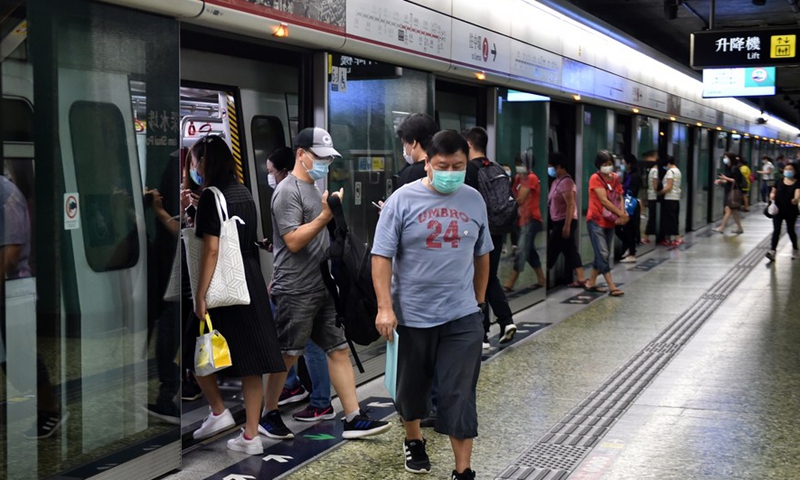The Chinese central government has been very supportive of the anti-epidemic work of the Hong Kong Special Administrative Region (HKSAR) government, but it is "outrageous" that some people with ulterior motives are smearing and damaging the relationship between the two when HK is seeing an increasing number of confirmed infections, said Carrie Lam, Chief Executive of HKSAR.

Passengers are seen at a subway station in Hong Kong, south China, July 20, 2020.Photo:Xinhua
Lam made the comments in an article "Fighting the Virus for Six Months Battling Another Wave of the Epidemic Together" on her Facebook account Saturday.
Lam said the central government has been very caring about the Hong Kong people, from arranging masks and other medical supplies to be sent to Hong Kong and assisting Hong Kong residents stranded in Hubei and abroad to return to Hong Kong at the beginning of the epidemic, to offering assistance to enhance testing capability and retrofitting the AsiaWorld Expo into a "mobile cabin hospital" upon her recent request.
It is "outrageous" that some people continue to take any opportunity to "smear and damage" the relationship between the central government and the HKSAR. With "ulterior motives," they have spread rumors, alleging that medical teams in the Chinese mainland will provide clinical services in Hong Kong's public hospitals and DNA samples of Hong Kong people will be delivered to the mainland, according to Lam.
In a meeting with HK politicians including Starry Lee Wai-king, head of the Democratic Alliance for the Betterment and Progress of Hong Kong and Stanley Ng Chau Pei, Chairman of the Federation of Trade Unions, He Jing, the deputy director of the Liaison Office of the Central People's Government in the HKSAR, said the central government will provide all necessary support in constructing makeshift hospitals and improve its nucleic acid testing capabilities.
Hong Kong microbiologist Yuen Kwok-yung told the Global Times on Sunday that he supports any move that is good for the HKSAR to control the epidemic. The BGI Genomics from the Chinese mainland, with its high quality and low fees, is helping to deal with Hong Kong's lack of testing capacity.
Yuen believes that the hospitals in Hong Kong have not yet reached their limits. Most patients are mild or asymptomatic infections and the AsiaWorld Expo will be able to provide 2,000 beds to treat mild cases. The demand for intensive care in Hong Kong is not high, as there are only about 30 severely ill patients who need a higher level of care.
"We can still observe for another week before considering more drastic measures. We have not even stopped dining out in eateries in mornings and afternoons," Yuen said.
But the situation would be very different if a sudden super spreading event in a number of elderly homes or in a housing estate with a faulty sewage system occurs, Yuen warned.
Cheung said the epidemic situation is "severe." If the epidemic gets worse, the HKSAR government will not hesitate to adopt more stringent control measures to further restrict business and reduce the space for citizens to go out, Cheung said.
However, at this stage, Cheung said that the HKSAR government has no intention of introducing a "stay at home order" or a "foot-free order" to restrict citizens from outdoor activities.
The number of confirmed cases in Hong Kong has seen sharp rises and daily new cases have broken new highs for several consecutive days, but many of those cases are of unknown origin. The city reported 133 new cases on Saturday, bringing the total to 2,506.


